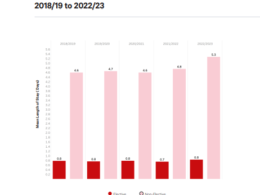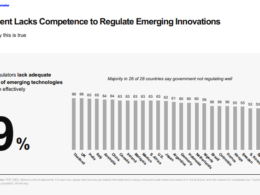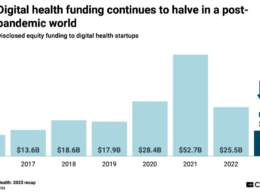the health strategist
institute and portal
for health transformation
& digital health strategy
Joaquim Cardoso MSc.
Chief Research and Strategy Officer (CRSO),
Chief Editor and Senior Advisor
November 28, 2023
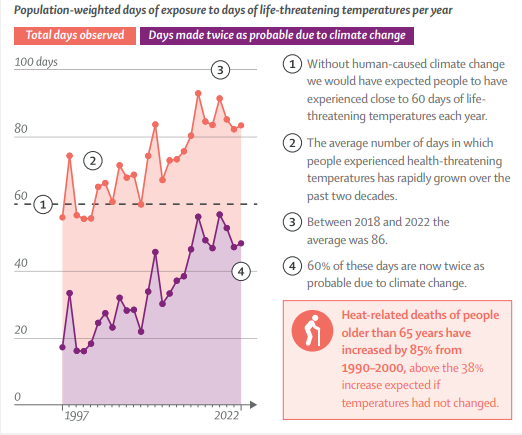
- 1.Without human-caused climate change we would have expected people to have experienced close to 60 days of lifethreatening temperatures each year.
- 2.The average number of days in which people experienced health-threatening temperatures has rapidly grown over the past two decades.
- 3.Between 2018 and 2022 the average was 86.
- 4.60% of these days are now twice as probable due to climate change.
- Heat-related deaths of people older than 65 years have increased by 85% from 1990–2000, above the 38% increase expected if temperatures had not changed.
Source: The Lancet
November 14, 2023
Deep Dive
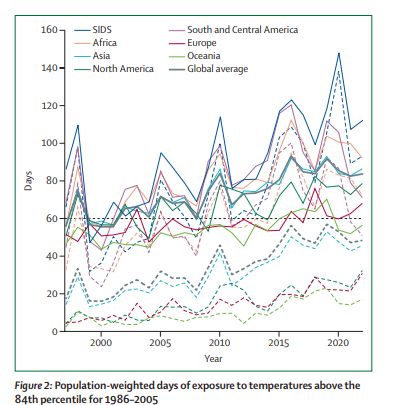
In a climate with no anthropogenic climate change, this value would be expected to be close to 60 days (dashed black line). The number of days of exposure to warm temperatures for different regions are displayed as solid lines; the heavy solid line is the global average. The number of days of exposure to warm temperatures made at least twice as probable due to climate change are plotted as dashed lines; the heavy dotted line is the global average. SIDS=Small Island Developing States
Indicator 1.1.5: heat-related mortality — headline finding:
In 2018–22, people experienced, on average, 86 days of health-threatening high temperatures annually. 60% of these temperatures were made more than twice as likely to occur by human-caused climate change Ageing populations, an increasing incidence of noncommunicable diseases in many countries, and urbanisation are increasing populations’ vulnerability to extreme heat.
Compounding with rising temperatures, this vulnerability is driving a rapid increase in heat-related deaths globally, a third of which are attributable to anthropogenic climate change.120
The first part of this indicator identifies days on which temperatures exceed a conservative threshold over which heat-related deaths are likely to increase (above the 83·6th percentile of temperatures in 1986–2005) and calculates the extent to which human-caused climate change increased their likelihood. It finds that people were exposed, on average, to 86 days per year of healththreatening high temperature in 2018–22 (figure 2), 60% of which were made more than twice as likely due to anthropogenic climate change.
The second part of the indicator combines exposure to temperatures above this threshold with an exposure– response function to model the change in heat-related mortality in people older than 65 years.121 In 2013–22, compared with 1991–2000, the estimated average annual heat-related mortality increased by 85%, driven by both warming and changing demographics. A counterfactual simulation keeping temperatures unchanged from baseline values shows that demographic changes alone would have resulted in just a 38% increase in mortality in 2013–22, compared with 1991–2000.122
Annual heat-related mortality of people older than 65 years is projected to increase by 370% above 1995–2014 levels by 2041–60 under a scenario compatible with limiting global temperature rise to 2°C, and by 433% under a scenario in which no further mitigation occurs, assuming no further adaptation. By 2081–2100, these mortality levels are projected to increase by 683% and 1537% for the two scenarios, respectively. 1.2 Health and extreme weather-related events Climate-change-driven increases in temperature and changes in rainfall patterns are increasing the frequency, intensity, and duration of life-threatening extreme weather and weather-related events.123
These events pose direct and indirect risks to physical and mental health.50,98,100–102,124–141 The indicators below track the changing incidence of key health-threatening extreme events. Efforts are ongoing to better capture the changing risk of floods — a crucial gap, which will be addressed in upcoming reports.
Source: The Lancet
November 14, 2023

The 2023 report of the Lancet Countdown on health and climate change: the imperative for a health-centred response in a world facing irreversible harms
Marina Romanello, Claudia di Napoli, Carole Green, Harry Kennard, Pete Lampard, Daniel Scamman, Maria Walawender, Zakari Ali, Nadia Ameli, Sonja Ayeb-Karlsson, Paul J Beggs, Kristine Belesova, Lea Berrang Ford, Kathryn Bowen, Wenjia Cai, Max Callaghan, Diarmid Campbell-Lendrum, Jonathan Chambers, Troy J Cross, Kim R van Daalen, Carole Dalin, Niheer Dasandi, Shouro Dasgupta, Michael Davies, Paula Dominguez-Salas, Robert Dubrow, Kristie L Ebi, Matthew Eckelman, Paul Ekins, Chris Freyberg, Olga Gasparyan, Georgiana Gordon-Strachan, Hilary Graham, Samuel H Gunther, Ian Hamilton, Yun Hang, Risto Hänninen, Stella Hartinger, Kehan He, Julian Heidecke, Jeremy J Hess, Shih-Che Hsu, Louis Jamart, Slava Jankin, Ollie Jay, Ilan Kelman, Gregor Kiesewetter, Patrick Kinney, Dominic Kniveton, Rostislav Kouznetsov, Francesca Larosa, Jason K W Lee, Bruno Lemke, Yang Liu, Zhao Liu, Melissa Lott, Martín Lotto Batista, Rachel Lowe, Maquins Odhiambo Sewe, Jaime Martinez-Urtaza, Mark Maslin, Lucy McAllister, Celia McMichael, Zhifu Mi, James Milner, Kelton Minor, Jan C Minx, Nahid Mohajeri, Natalie C Momen, Maziar Moradi-Lakeh, Karyn Morrissey, Simon Munzert, Kris A Murray, Tara Neville, Maria Nilsson, Nick Obradovich, Megan B O’Hare, Camile Oliveira, Tadj Oreszczyn, Matthias Otto, Fereidoon Owfi, Olivia Pearman, Frank Pega, Andrew Pershing, Mahnaz Rabbaniha, Jamie Rickman, Elizabeth J Z Robinson, Joacim Rocklöv, Renee N Salas, Jan C Semenza, Jodi D Sherman, Joy Shumake-Guillemot, Grant Silbert, Mikhail Sofiev, Marco Springmann, Jennifer D Stowell, Meisam Tabatabaei, Jonathon Taylor, Ross Thompson, Cathryn Tonne, Marina Treskova, Joaquin A Trinanes, Fabian Wagner, Laura Warnecke, Hannah Whitcombe, Matthew Winning, Arthur Wyns, Marisol Yglesias-González, Shihui Zhang, Ying Zhang, Qiao Zhu, Peng Gong*, Hugh Montgomery*, Anthony Costello*
Key findings of the 2023 report of the Lancet Countdown on health and climate change
Alarming new projections reveal soaring health risks of persistent global inaction over the climate emergency.
The health threats experienced to date are an early symptom of the dangers our future might hold. Despite continued warnings of the risks, and regardless of agreed targets to limit temperature rise, the world is accelerating in the wrong direction.
However, for all the negatives, there are still positive signals of progress, and opportunities to deliver a healthy, thriving future for people all around the world. Building upon the progress already made, the Commission makes recommendations to maximise the benefits of climate change action for people’s health and wellbeing.
Explore the key findings and recommendations of the 2023 report of the Lancet Countdown on health and climate change in the infographic below, or read the full report for more details.
Infographic
https://www.thelancet.com/infographics-do/climate-countdown-2023





